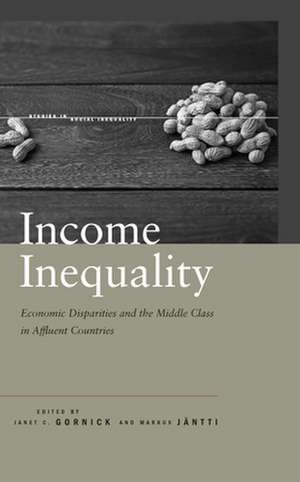Income Inequality: Economic Disparities and the Middle Class in Affluent Countries: Studies in Social Inequality
Editat de Janet Gornick, Markus Jänttien Limba Engleză Paperback – 31 iul 2014
This state-of-the-art volume presents comparative, empirical research on a topic that has long preoccupied scholars, politicians, and everyday citizens: economic inequality. While income and wealth inequality across all populations is the primary focus, the contributions to this book pay special attention to the middle class, a segment often not addressed in inequality literature.
Written by leading scholars in the field of economic inequality, all 17 chapters draw on microdata from the databases of LIS, an esteemed cross-national data center based in Luxembourg. Using LIS data to structure a comparative approach, the contributors paint a complex portrait of inequality across affluent countries at the beginning of the 21st century. The volume also trail-blazes new research into inequality in countries newly entering the LIS databases, including Japan, Iceland, India, and South Africa.
Written by leading scholars in the field of economic inequality, all 17 chapters draw on microdata from the databases of LIS, an esteemed cross-national data center based in Luxembourg. Using LIS data to structure a comparative approach, the contributors paint a complex portrait of inequality across affluent countries at the beginning of the 21st century. The volume also trail-blazes new research into inequality in countries newly entering the LIS databases, including Japan, Iceland, India, and South Africa.
| Toate formatele și edițiile | Preț | Express |
|---|---|---|
| Paperback (1) | 237.84 lei 6-8 săpt. | |
| Stanford University Press – 31 iul 2014 | 237.84 lei 6-8 săpt. | |
| Hardback (1) | 716.02 lei 6-8 săpt. | |
| Stanford University Press – 13 aug 2013 | 716.02 lei 6-8 săpt. |
Din seria Studies in Social Inequality
-
 Preț: 174.96 lei
Preț: 174.96 lei -
 Preț: 177.64 lei
Preț: 177.64 lei -
 Preț: 257.29 lei
Preț: 257.29 lei -
 Preț: 197.99 lei
Preț: 197.99 lei -
 Preț: 195.80 lei
Preț: 195.80 lei -
 Preț: 251.37 lei
Preț: 251.37 lei -
 Preț: 102.54 lei
Preț: 102.54 lei -
 Preț: 172.50 lei
Preț: 172.50 lei -
 Preț: 198.43 lei
Preț: 198.43 lei -
 Preț: 154.20 lei
Preț: 154.20 lei -
 Preț: 204.16 lei
Preț: 204.16 lei -
 Preț: 157.07 lei
Preț: 157.07 lei -
 Preț: 199.10 lei
Preț: 199.10 lei -
 Preț: 147.04 lei
Preț: 147.04 lei -
 Preț: 208.69 lei
Preț: 208.69 lei - 19%
 Preț: 511.21 lei
Preț: 511.21 lei -
 Preț: 517.28 lei
Preț: 517.28 lei -
 Preț: 518.09 lei
Preț: 518.09 lei -
 Preț: 226.67 lei
Preț: 226.67 lei -
 Preț: 177.87 lei
Preț: 177.87 lei - 19%
 Preț: 482.53 lei
Preț: 482.53 lei -
 Preț: 523.09 lei
Preț: 523.09 lei -
 Preț: 225.71 lei
Preț: 225.71 lei - 19%
 Preț: 452.09 lei
Preț: 452.09 lei -
 Preț: 483.04 lei
Preț: 483.04 lei -
 Preț: 302.01 lei
Preț: 302.01 lei -
 Preț: 446.64 lei
Preț: 446.64 lei -
 Preț: 518.09 lei
Preț: 518.09 lei -
 Preț: 521.90 lei
Preț: 521.90 lei - 19%
 Preț: 476.75 lei
Preț: 476.75 lei -
 Preț: 482.06 lei
Preț: 482.06 lei -
 Preț: 485.15 lei
Preț: 485.15 lei
Preț: 237.84 lei
Nou
Puncte Express: 357
Preț estimativ în valută:
45.51€ • 47.74$ • 37.89£
45.51€ • 47.74$ • 37.89£
Carte tipărită la comandă
Livrare economică 01-15 aprilie
Preluare comenzi: 021 569.72.76
Specificații
ISBN-13: 9780804793346
ISBN-10: 0804793344
Pagini: 540
Dimensiuni: 156 x 235 x 38 mm
Greutate: 0.65 kg
Editura: Stanford University Press
Colecția Stanford University Press
Seria Studies in Social Inequality
ISBN-10: 0804793344
Pagini: 540
Dimensiuni: 156 x 235 x 38 mm
Greutate: 0.65 kg
Editura: Stanford University Press
Colecția Stanford University Press
Seria Studies in Social Inequality
Recenzii
"This book is a valuable addition to the existing literature on economic inequality . . . This is an excellent book that is highly recommended to those with an interest in all aspects of income distribution in contemporary societies . . . [Gornick and Jäntti] need to be congratulated for broadening the focus beyond a purely economic perspective on the issues under examination."—Peter Saunders, Review of Income and Wealth
"Janet C. Gornick and Markus Jäntti's Income Equality is one fruit of this massive research effort. The book consists of studies of contemporary inequality trends using the [Luxembourg Income Study] data woven into a rich tapestry of understanding of a complex historical episode. The contributors—economists, sociologists, political scientists—analyze the data using powerful methodologies capable of laying bare the underlying structure that human intuition cannot access . . . The combination of high-quality data comparable across countries, international coverage of a period of major change, and insightful analysis based on sophisticated methodologies makes this book a major contribution to our understanding of income. Income Inequality will influence research for years to come."—François Nielsen, American Journal of Sociology
"A timely, informative volume for students and researchers concerned with income inequality . . . Recommended."—R. S. Rycroft, CHOICE
"This is one of the most important books on inequality published in the past decade. Focusing on what has happened to the middle class since the 1980s, during a period of substantial economic and political restructuring, this volume's remarkable insights and influence will span disciplines."—Jason Beckfield, Harvard University
Notă biografică
Janet C. Gornick is Professor of Political Science and Sociology at the Graduate Center of the City University of New York, and Director of LIS. Markus Jäntti is Professor of Economics at the Swedish Institute for Social Research, Stockholm University, and Research Director of LIS.
Descriere
This volume presents cross-nationally comparative evidence on income inequality trends, women's employment and its effect on inequality, the distribution of wealth, and the interaction of politics with inequality across several mainly high-income countries.
Cuprins
Introduction
1. How Has Income Inequality Grown? The Reshaping of the Income Distribution in LIS Countries
2. On the Identification of the Middle Class
3. Has Rising Inequality Reduced Middle-Class Income Growth?
4. Welfare Regimes, Cohorts and the Middle Classes
5. Political Sources of Government Redistribution in High-Income Countries
6. Income Distribution, Inequality Perception and Redistributive Preferences in
7. Women's Work, Inequality, and the Economic Status of Families
8. Women's Employment, Unpaid Work, and Economic Inequality
9. Women's Work, Family Earnings, and Public Policy
10. Wealth: The Distribution of Assets and Debt
11. The Joint Distribution of Income and Wealth
12. The Fourth Retirement Pillar in Rich Countries
13. Public Pension Entitlements and the Distribution of Wealth
14. Income and Wealth Inequality in Japan
15. Income and Wealth Inequality in Japan
16. Horizontal and Vertical Inequalities in India
17. Post-Apartheid Changes in South African Inequality
Conclusion
1. How Has Income Inequality Grown? The Reshaping of the Income Distribution in LIS Countries
2. On the Identification of the Middle Class
3. Has Rising Inequality Reduced Middle-Class Income Growth?
4. Welfare Regimes, Cohorts and the Middle Classes
5. Political Sources of Government Redistribution in High-Income Countries
6. Income Distribution, Inequality Perception and Redistributive Preferences in
7. Women's Work, Inequality, and the Economic Status of Families
8. Women's Employment, Unpaid Work, and Economic Inequality
9. Women's Work, Family Earnings, and Public Policy
10. Wealth: The Distribution of Assets and Debt
11. The Joint Distribution of Income and Wealth
12. The Fourth Retirement Pillar in Rich Countries
13. Public Pension Entitlements and the Distribution of Wealth
14. Income and Wealth Inequality in Japan
15. Income and Wealth Inequality in Japan
16. Horizontal and Vertical Inequalities in India
17. Post-Apartheid Changes in South African Inequality
Conclusion
















